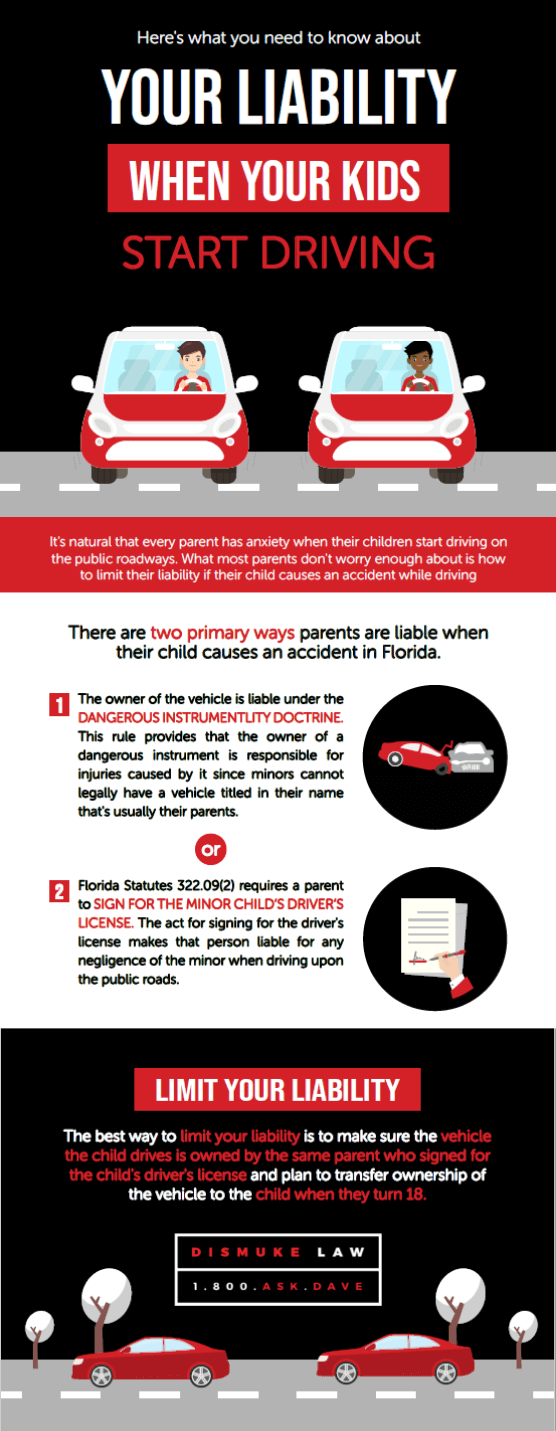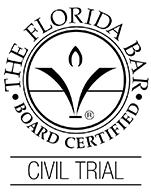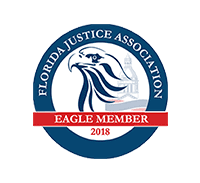Driver’s License Requirements for Teens
When a minor receives a license, their parent(s) or guardian(s) are liable for any financial repercussions that may arise.
To obtain a driver’s license, Florida teens must reach the age of 15, and their parents must sign a consent form to obtain a learner’s permit, according to the Florida Department of Highway Safety and Motor Vehicles (FLHSMV). You must also show proof of completion of the Traffic Law and Substance Abuse Education course, pass vision and hearing tests, and pass a multiple-choice test featuring questions on traffic laws and signs.
After holding a learner’s permit for one year and reaching the age of 16, your teen may begin the process to obtain their driver’s license. A signature from a parent or legal guardian on the Certification of Minor Driving Experience Form is a requirement for a teen to obtain a driver’s license. Your teen must complete 50 hours old driving time, including ten at night. Once your teen completes the driving skills test, they receive a license.
Parents can track the number of hours their teen drives by filling out a practice log sheet. This ensures your teen has the number of hours of driving experience necessary under Florida law.

Copy and paste the code below to share this image:
What Is Parental Liability?
In all 50 states, parental liability means that parents are responsible for the damage their child causes via negligent, intentional, and criminal acts until the child reaches the age of majority, which is typically 18.
This means parents or legal guardians have an obligation under the law to pay for the damages.
Teenage Driver Parental Liability
Parents in Florida can be held liable for damages their teen causes while driving. By signing the certification so your teen can obtain their driver’s license, you are certifying that your teen has the experience to safely and responsibly handle a vehicle on the road.
If your child drives negligently or recklessly after obtaining their driver’s license, you can be held liable for it, according to Florida Statutes § 322.09. This means if your teen negligently causes a car accident that results in property damage, personal injury, or wrongful death, you are liable to pay the damages.
In addition, you are also liable if your teen drives and gets into an accident with your vehicle under the dangerous instrumentality doctrine, which holds the vehicle owner liable for damages.
Damages Parents Can Be Liable to Cover
Personal injury and wrongful death damages can run into six and seven figures depending on the severity of the other driver’s injuries and their earning capacity. If your teen is at fault for a car accident, you could be responsible for covering the following damages when and if the other party files a claim:
- Medical bills
- Lost income
- Property damage
- Household services
- Child care costs
- Funeral expenses
- Pain and suffering
- Disability
- Disfigurement
- Emotional distress
Florida law requires all drivers to carry personal injury protection (PIP) insurance, which covers a significant portion of damages such as medical bills. Your liability insurance, on the other hand, covers damages the other driver suffers if their own PIP insurance runs out of coverage.
The other driver can file a personal injury or wrongful death lawsuit against you to recover compensation for their losses, which could result in an increase in your insurance premiums. This would be the case if your teen negligently causes an accident, but the other party would have to prove the negligence.
Limiting Liability and Preventing Accidents
There is much at stake whenever your teen drives a vehicle, including the risk that they will sustain serious injuries or die. So, it’s not just about financial liability. However, there are ways you can prevent your teen from getting into a car accident and limit your liability.
One way in which parents can limit their liability is by not allowing their teen to obtain a driver’s license until they reach the age of 18. But this could be impractical. Alternatively, parents can purchase additional insurance coverage, have their teen purchase and title their own vehicle, and educate their teen to prepare them for the responsibilities of driving and the consequences of making bad decisions on the road.
Setting Rules for Your Teen Driver
To keep your teen safe in the event of a car accident, we recommend that parents set rules and restrictions they must follow if they want to continue driving and exercising their independence.
For instance, parents can require their teens to secure their seat belts before they even start the vehicle. Parents can also restrict the number of passengers, set a curfew so they are not driving too late at night, bar cell phone use, and stress that drinking and driving are unacceptable, not to mention illegal.
Learn More About Parental Liability and Teenage Drivers Today
It’s hard for parents to send their children out into the world. Part of that is watching them obtain their driver’s licenses and trusting them to drive safely and responsibly. Driving is a privilege and one that teens must take seriously to prevent accidents.
An attorney from Dismuke Law can help you and your teen driver understand parental liability and how their choices on the road can impact them and you. To learn more about parental liability when it comes to teenage drivers or to talk to us about your car accident case, please contact us to Ask Dave today.



![cftla-member[2]](https://www.1800askdave.com/wp-content/uploads/2022/03/cftla-member2.png)
![cftla-member[3]](https://www.1800askdave.com/wp-content/uploads/2022/03/cftla-member3.png)










